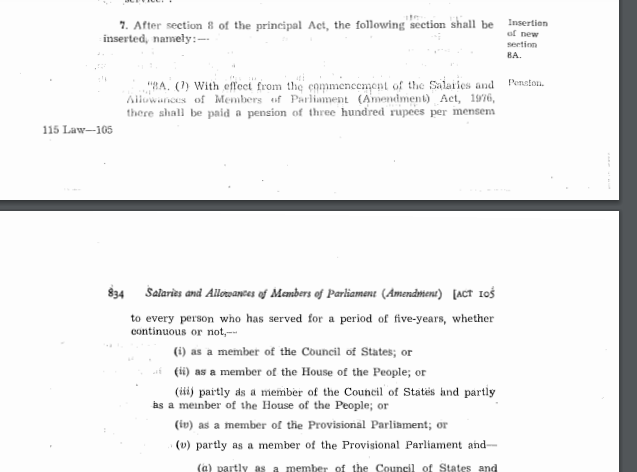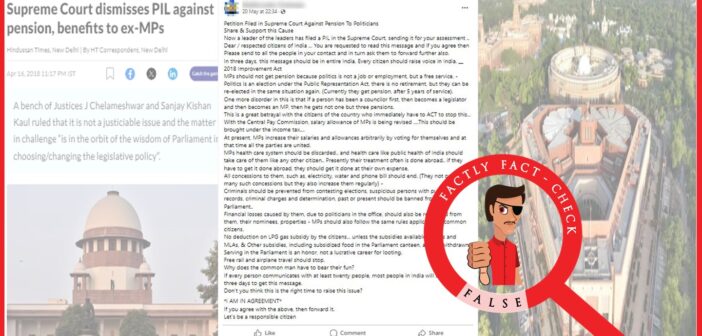A post claiming that a petition has been filed in the Supreme Court regarding pensions to politicians is being widely shared across social media platforms (here, here, & here). In this post, the individual expresses their opinion on why politicians should not receive pensions. Through this article, let’s fact-check the claim made in the post.

Claim: Recently, a petition regarding the pensions of politicians has been filed in the Supreme Court.
Fact: The Supreme Court had previously dismissed a PIL on the same issue, affirming the legality of salaries, pensions, and other perks of MPs. In 2022, the Madhya Pradesh High Court also dismissed a PIL filed on the same issue. Since then, there have been no reports of any such petition being filed regarding the salaries or pensions of politicians in recent times. Hence, the claim made in the post is FALSE.
First, let us look at the laws and acts in our country that govern salaries and other perks of MPs.
The Salary, Allowances and Pension of Members of Parliament Act, 1954:
Article 106 of the Constitution empowers Parliament to make laws regarding salaries and other allowances of MPs. Accordingly, The Salary, Allowances, and Pension of Members of Parliament Act, 1954 was enacted. This Act originally made no mention of pensions for MPs but only salaries and other allowances. However, in 1976, an amendment to this Act provided pensions to former MPs for the first time. The 1954 law has been amended many times since then.

Until 2018, Parliament periodically passed laws to revise the salaries of MPs. In 2018, through the Finance Act (archived link), Parliament amended the law setting the salaries for MPs. It revised their salaries and stipulated that the salary, daily allowance, and pension of MPs shall be increased every five years, based on the cost inflation index provided under the Income-tax Act, 1961. Furthermore, in 1985, Parliament enacted a law that delegated the power to set and revise certain allowances for MPs, such as constituency allowance, office allowance, and housing allowance, to the central government. In April 2020, an ordinance was passed reducing the salaries of MPs due to the COVID-19 pandemic.
According to the Ministry of Parliamentary Affairs, MPs (both Lok Sabha and Rajya Sabha) currently receive a salary of one lakh rupees per month. In addition, the government provides ₹70,000 as a constituency allowance and ₹60,000 as a secretarial and office allowance to MPs.
The Lok Sabha Secretariat released a circular in January 2021 revising the meal prices in the Parliament canteen.
According to the Income Tax Department, the salary received by an MP or MLA will be taxed under ‘other sources of income.’ While the constituency allowances, office allowances, and other allowances received from the government are exempt from tax, the central government also has made it clear that the money received as basic salary by MPs will be taxed under ‘other sources of income.’

In 2017, a PIL seeking the cancellation of MPs’ pensions was filed in the Supreme Court:
In 2017, a voluntary organization named ‘Lok Prahari’ filed a PIL in the Supreme Court challenging the constitutionality of certain earlier amendments to The Salary, Allowances, and Pension of Members of Parliament Act, 1954, which pertained to the provision of salaries and other perks to MPs. The petition also argued that providing pensions and other benefits to MPs even after retirement violates Article 14 of the Constitution, and Parliament lacks the authority to grant pensions and other benefits to members of the legislature without enacting any law.
When the Supreme court questioned the central government’s stance on the matter, the Center informed the Supreme Court that the entitlement of former Members of Parliament (MPs) to receive pension and other benefits is justified, as it is necessary to safeguard their dignity even after the conclusion of their tenure.
The Supreme Court, upon scrutinizing the constitutionality of the laws cited in this PIL, dismissed it in 2018. In its verdict, the Supreme Court affirmed that Parliament has the authority to enact laws concerning the provision of pensions to former MPs. The dismissal of the PIL was based on the Supreme Court’s judgment in the case of Common Cause, A Registered Society vs. Union of India.

In 2022, another PIL was filed in The Madhya Pradesh High Court, urging it to direct both the Madhya Pradesh and Central governments to grant a lifetime pension only to individuals who have served as MPs/MLAs for a minimum of five years. However, upon examination, the court dismissed this PIL, citing that the Supreme Court had already issued an unfavourable judgment on the raised issues (as seen in the 2018 Lok Prahari PIL mentioned above).

There are no recent reports of any such petition being filed regarding the salaries or pensions of politicians in recent times.
To sum up, no petitions have been filed recently regarding the pension of politicians. The Supreme Court dismissed a PIL filed in this regard in 2018.



